The history of Moldova can be traced to the 1350s, when the Principality of Moldavia, the medieval precursor of modern Moldova and Romania, was founded. The principality was a vassal of the Ottoman Empire from 1538 until the 19th century. In 1812, following one of several Russian–Turkish wars, the eastern half of the principality, Bessarabia, was annexed by the Russian Empire. In 1918, Bessarabia briefly became independent as the Moldavian Democratic Republic and, following the decision of the Parliament, united with Romania. During the Second World War it was occupied by the Soviet Union which reclaimed it from Romania. It joined the Union as the Moldavian ASSR, until the dissolution of the USSR. In 1991 the country declared independence as the Republic of Moldova.

The president of the People's Democratic Republic of Algeria is the head of state and chief executive of Algeria, as well as the commander-in-chief of the Algerian People's National Armed Forces.

Vladimir Voronin is a Moldovan politician. He was the third President of Moldova from 2001 until 2009 and has been the leader of the Party of Communists of Moldova (PCRM) since 1994. He was Europe's first democratically elected communist party head of state after the dissolution of the Eastern Bloc.

The president of the Slovak Republic is the head of state of Slovakia and the commander-in-chief of the Armed Forces. The people directly elect the president for five years, for a maximum of two consecutive terms. The presidency is essentially a ceremonial office, but the president does exercise certain limited powers with absolute discretion. The president's official residence is the Grassalkovich Palace in Bratislava.
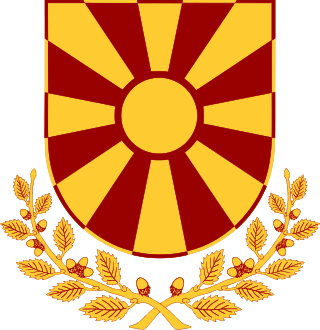
The president of the Republic of North Macedonia is the head of state of North Macedonia.

The politics of Transnistria, a de facto independent state situated de jure within the Republic of Moldova in Eastern Europe, take place in a framework of a semi-presidential republic, whereby the President of Transnistria is head of state and the Prime Minister of Transnistria is head of government. Executive power is exercised by the government. Legislative power is vested in both the government and parliament. Formally, Transnistria has a multi-party system and a unicameral parliament, called the Supreme Council. The president is elected by popular vote. The latest parliamentary elections were held in November 2020.
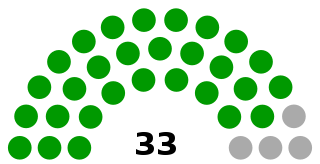
The Supreme Council of the Pridnestrovian Moldavian Republic is the parliament of Transnistria. The unicameral legislature consists of 33 seats, all of which are determined by single mandate constituencies. It is headed by a chairman.
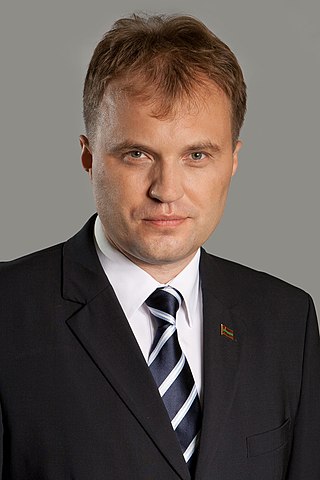
Yevgeny Vasilyevich Shevchuk is a Transnistrian former politician who served as the 2nd President of the internationally unrecognized Pridnestrovian Moldovan Republic, better known as Transnistria, from 2011 to 2016.

The election of the president and the vice president of the United States is an indirect election in which citizens of the United States who are registered to vote in one of the fifty U.S. states or in Washington, D.C., cast ballots not directly for those offices, but instead for members of the Electoral College. These electors then cast direct votes, known as electoral votes, for president, and for vice president. The candidate who receives an absolute majority of electoral votes is then elected to that office. If no candidate receives an absolute majority of the votes for president, the House of Representatives elects the president; likewise if no one receives an absolute majority of the votes for vice president, then the Senate elects the vice president.
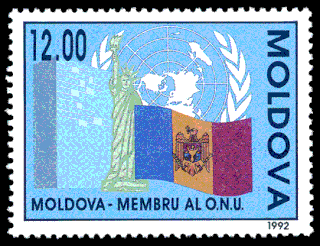
The following is timeline of the History of independent Moldova which started after the independence of Moldova.

Presidential elections were held in Moldova on 16 December 2011. The president was elected by the parliament in an indirect election. After the election on 16 December failed, a second attempt was made on 15 January 2012. However, that vote was annulled as being unconstitutional since it had not been held in a secret vote. On 16 March, parliament elected Nicolae Timofti as president by 62 votes out of 101, with the PCRM boycotting the election, putting an end to a political crisis that had lasted since April 2009.
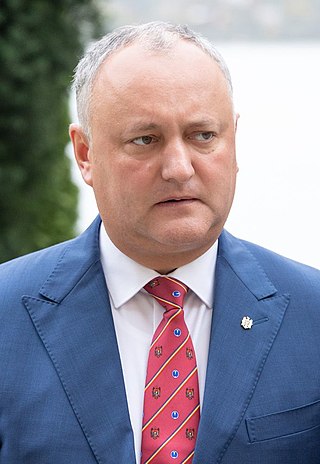
Igor Dodon is a Moldovan politician who previously served as the President of Moldova from 23 December 2016 to 24 December 2020. He currently serves as the leader of the Party of Socialists of the Republic of Moldova. He served as Minister of Economy and Trade in the governments of Vasile Tarlev and Zinaida Greceanîi from September 2006 to September 2009 and was a member of the Parliament of Moldova from 2009 to 2016. He lost his bid for re-election in 2020 to Maia Sandu, whom he had defeated four years earlier in the 2016 Moldovan presidential election.
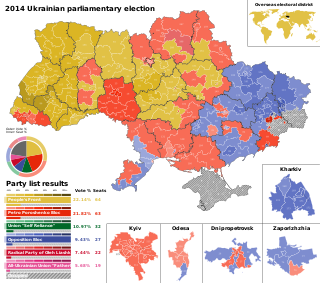
Snap parliamentary elections were held in Ukraine on 26 October 2014 to elect members of the Verkhovna Rada. President Petro Poroshenko had pressed for early parliamentary elections since his victory in the presidential elections in May. The July breakup of the ruling coalition gave him the right to dissolve the parliament, so on 25 August 2014 he announced the early election.
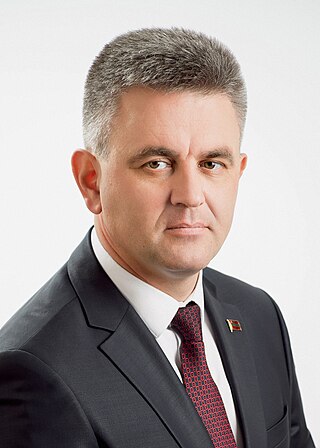
Vadim Nikolayevich Krasnoselsky is a Transnistrian politician who is the 3rd and current President of Transnistria. Previously, he served as a member of the Supreme Council of Transnistria from the 7th district, as 6th Speaker of the Supreme Council (2015–2016) and the 7th Minister of the Interior.

Presidential elections were held in Russia from 15 to 17 March 2024. It was the eighth presidential election in the country. The incumbent president Vladimir Putin won with 88% of the vote, the highest percentage in a presidential election in post-Soviet Russia, gaining a fifth term in what was widely viewed as a foregone conclusion. He is scheduled to be inaugurated on 7 May 2024.
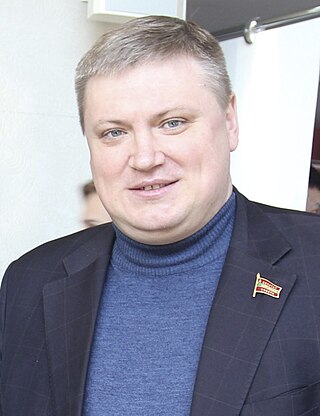
Oleg Olegovich Khorzhan was a Transnistrian politician who served as the chairman of the Transnistrian Communist Party and as a member of Transnistria's Supreme Council.
Presidential elections were held in Transnistria on 12 December 2021 with early voting starting on 6 December 2021. Two candidates were able to register to participate in the elections — incumbent president Vadim Krasnoselsky, and Sergey Pynzar, who came in second in 2016.
Sergey Pynzar is a Transnistrian lawmaker of the Grigoriopol District legislature.
Events in the year 2021 in Transnistria.
























